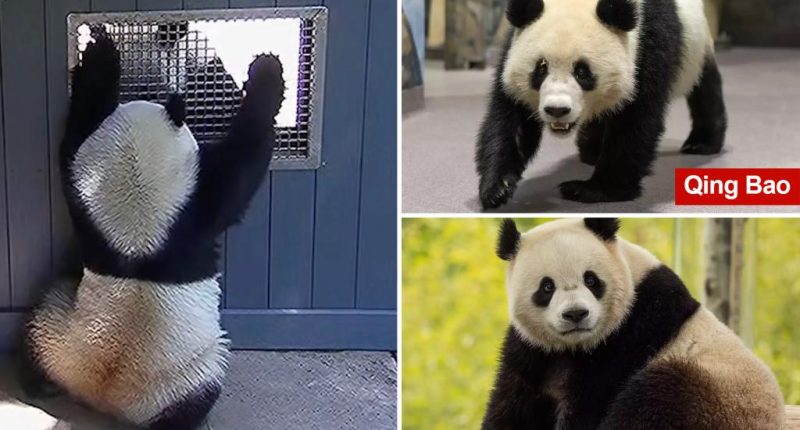Share this @internewscast.com
Beary romantic!
The two giant pandas in the US stirred excitement at the Smithsonian’s National Zoo on Friday when they were seen showing interest in each other, which zookeepers are hopeful could mean baby pandas might soon be on the way.
Footage showed the pandas, Bao Li and Qing Bao, making “bleating” and “chirping” sounds at each other through a metal mesh window, called their “howdy” window, at the David M. Rubenstein Family Giant Panda Habitat in Washington, D.C.

In the clip shared by the National Zoo, Qing Bao, the female, stood up and put both of her front paws on the “howdy” window.
Bao Li, the male and usually the more vocal of the pair, appeared thrilled by Qing Bao’s attention. He pressed his face against the mesh window, and the two pandas engaged in an exchange lasting nearly a minute, as shown in the video.
The pair exchanged a series of high-pitched squeals and “bleats” that panda keepers from the Smithsonian describe as “like a sheep’s ‘baa,’ but with a higher pitch and longer trill.”
The two love bears have been in their enclosures since January, and the panda keepers have kept a close eye on their behavior.
“Just as we began to wonder whether our bears were entering ‘panda puberty,’ something exciting happened,” the experts said.
The first positive sign of a connection between them was in April, when Qing Bao approached the “howdy” window and chirped and bleated at Bao Li.
“A sign that she was very interested in him,” the experts said.
Qing Bao — whose name translates to “precious treasure,” inspired by the lush mountains of China — is usually more reserved and independent than her counterpart, according to the zookeepers.
Bao Li, meanwhile, is a showman and a loudmouth who’s much more likely to “bleat” than his female counterpart, they said. When his keepers arrive, he often “bleats” a greeting at them. His name is a combination of the words “precious” and “powerful.”

Zookeepers hope the flirtations could develop into mating and future panda cubs to help repopulate the endangered species. However, both pandas are a few years away from being able to procreate.
Bao Li and Qing Bao join a partnership between China and the US that goes back more than 50 years.
China loans a pair of pandas to American zoos for 10-year spans before the bears are returned to China. If a pair has cubs, the babies are sent back to China to be raised in their natural habitat.
The deal is a show of goodwill between the two superpowers and an attempt to help the endangered species make panda babies.
Qing Bao and Bao Li will live at the National Zoo until April 2034, according to the agreement.
Many of the behaviors the panda keepers saw in Bao Li were similar to his grandfather, Tian Tian, when he was readying himself for breeding; and many of Qing Bao’s behaviors mirrored those of Bao Li’s grandmother, Mei Xiang, as she approached mating age, experts said.

















